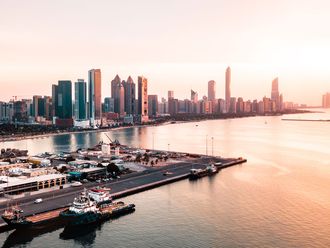Italy is back in recession and approaching deflation; Germany’s economy has shrunk and France stagnates. In Britain, there are a record number of jobs but plummeting real wages. Only the US — which borrowed massively, restructured its banks and printed money on a historic scale — enjoys anything like a sustainable recovery, and even that’s being sustained only by the promise that quantitative easing will go on ad infinitum.
Although its social impact has been milder than that of the 1930s, the crisis that began in 2008 has been longer and by some measures deeper. As a result, we have quietly entered the “exit” phase economic historians warned about: A competitive dash for safety driven by economic nationalism. The first moves are being made by proxy and centre around the diplomatic conflict over Ukraine.
Capital flight from Russia is real and massive: The $150 billion (Dh550.5 billion) or so that has left Russia this year — combined with the complete dry-up of inward investment — will permanently alter Russia’s position in the financial system. Russia’s agricultural trade embargo with the EU is also real. Like all disruptions to global free trade, these moves will create, almost immediately, new patterns that will be hard to break.
For example, Greek peach farmers face ruin as their produce rots at the roadside. The Turkish government, meanwhile, has enraged Greeks by pledging to step up exports to Russia to fill the gap. Greek politicians are under pressure from the leftwing opposition party Syriza to defy the EU sanctions on Russia; in reply, they have pointed out to voters not only that the EU holds their country’s debt, but also that, if they recognise Russia’s hold on Crimea, they might as well recognise Turkey’s hold on northern Cyprus. Thus do peaches and nectarines turn into issues involving debt mountains, military no-go zones and historic ethnic rivalries.
These eddies of trouble, the revival of secondary disputes and the mixture of economic policy with diplomatic grievances and popular rhetoric all echo the atmosphere of the early 1930s.
Even more ominous is the fragmentation of the global news agenda, and with it public opinion, into clear propaganda blocs. It is not only President Vladimir Putin’s propaganda channels that spew untruths: If you read certain magazines in the US and rely on Twitter, it is possible to believe that the Ukrainians shot down MH17, that Barack Obama ordered the poison gas attack on east Damascus last summer, that the West “provoked” the conflict in Ukraine in order to boost the fracking industry, and so on.
When trade wars start, mirrored by conspiracy wars, the next thing to expect is the Balkanisation of the internet and it is happening. Censorship, shutdowns, the arrest of bloggers and tweeters: These tactics were pioneered in Syria, exploited in Turkey and Egypt and are being perfected in Russia.
Although it seems like a separate thing — a hangover from the cold war or a product of an “accidental” revolution — the Ukraine dispute cannot be kept clear of the economic fault lines produced by the six-year crisis. These fault lines lie at the heart of the Eurozone, and between Europe and the US, and central to all of them is Germany.
Mercantilist strategy
It is clear that Germany has pursued a mercantilist strategy throughout the euro project. It has become the continent’s productive powerhouse by rigging all economic relationships in its favour. When all boats were rising, nobody noticed; now voters in Greece, Italy and Spain not only notice but also react. They look at their own jobless rates — 25 per cent and rising — and at Germany’s — just 5 per cent — and see a system stacked in favour of growth in northern Europe and depression in the south.
They observe that this Germany, so ruthless in the imposition of EU rules when it came to austerity, is now lax and unwilling in the pursuit of collective sanctions against Russia.
Meanwhile, there is rising frustration in the US over what it sees as Europe’s weakness over Russia. In July, Russian banks allied to Putin’s clique were sealed off from issuing bonds on Wall Street, only to issue them the next week in Frankfurt.
Since 2008, three streams of instability have dominated world affairs: The economic crisis; social unrest among a thwarted young generation that produced the Arab Spring and the Occupy movements; and increased diplomatic rivalry between Russia, its proxies and the West.
Since the start of 2014, these streams have begun to veer into each other and collide. Euromaidan was a delayed echo of the social unrest wave, driven by the country’s economic failure; it collided with a diplomatic situation that was already fractious over Syria. It has produced, via the murder of 298 people on MH17, the first significant use of economic sanctions between developed countries since the era of globalisation began.
Many chroniclers of the 1930s say the decade only really took on its doomed, chaotic character when major countries left the gold standard (Britain first in 1931, Italy last five years later). Today, a breakup of the world system would take a different form: The competitive devaluation of currencies in which large amounts of debt are held by other countries, or the closure of financial markets to certain countries. We are still far from this but not unimaginably far.
After the release of last week’s GDP figures, the debt dynamics of Europe above all Italy once again look ominous. Italy has the Eurozone’s biggest debts and is the biggest loser from the arrangement whereby Germany profits from everyone else’s inefficiency. Without recovery, not only do its debts look unsustainable; it also becomes yet another candidate for imposed austerity and technocratic government. It is possible that, at some point, there will be a replay of summer 2011, in which a bond market crisis has to be averted by concerted global action, but this time with Italy rather than Greece and Spain needing the bailout. Such action will be all the harder in a world where trade and financial markets have become weapons of diplomatic war, in which anti-globalist parties of the right and left have significantly more support, and where the global order looks much more worn and frayed.
— Guardian News & Media Ltd
Paul Mason is economics editor of Channel 4 News.








